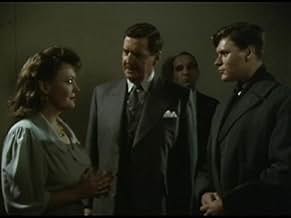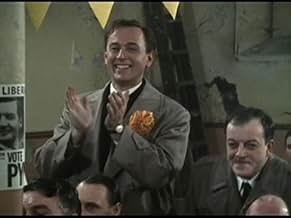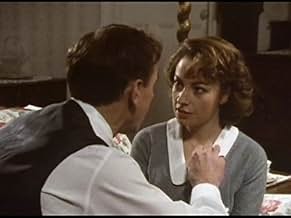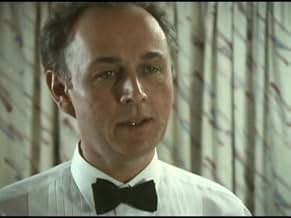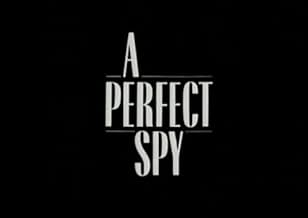A Perfect Spy
- Mini serie TV
- 1987
- 6h 14min
VALUTAZIONE IMDb
7,3/10
1128
LA TUA VALUTAZIONE
Aggiungi una trama nella tua linguaThe rise and fall of Magnus Pym and his career through intelligence. From chance meetings with people will be important to him in the future to a life in Czechoslovakia, Pym weaves his way t... Leggi tuttoThe rise and fall of Magnus Pym and his career through intelligence. From chance meetings with people will be important to him in the future to a life in Czechoslovakia, Pym weaves his way through the complicated world of espionage.The rise and fall of Magnus Pym and his career through intelligence. From chance meetings with people will be important to him in the future to a life in Czechoslovakia, Pym weaves his way through the complicated world of espionage.
- Candidato a 2 Primetime Emmy
- 1 vittoria e 6 candidature totali
Sfoglia gli episodi
Recensioni in evidenza
There is a brilliant lesson of sorts here about narrative depth, but you must know the book. Lavishly conceived by Le Carre as his magnum opus, the book is not any other spy thriller you picked up on an airport, it's one of the most tantalizing I know. The center is this, a mysterious man, posing as someone else, is holed up in a small room in Dorset overlooking the ocean and recalls a whole journey through life.
The childhood stream-of-consciousness where he attempts to be Faulkner without conquering the madness doesn't work; so much else does. It has a strong sense of presence in several places from Greek islands to Washington, the center of control. It has a sense of anxious premonition about the extents of control. It has a narrator writing a memoir while efforts are underway to apprehend him before he defects to the other side. It has several relationships of ambiguous love defined in his imagination. It has a disappearance in the middle of the night and a strange encounter in a Czech barn.
This, it just won't do.
The most glaring fault by far is that they simplified the structure, making it a linear telling in one go (practically). The childhood segment works even less because when seen, it loses the shroud of memory. Seeing Rick is never going to be as powerful as sensing him move through room's of the son's memory. It still covers most of the narrative ground but we lose the premonition, we lose the mystifying sense of machinery set in motion long ago and discovered only when the ground beneath our feet shifts, we lose the depth of the betrayal of love. We lose it all and get a nicely groomed play. Its idea of profound emotion is actors grimacing in close up; I was stunned to see that it's from the late 80s, it looks 20 years older.
I don't know if this is watchable fiction, maybe it is, but it's a complete catastrophe where it should go beyond it and give us lives, contact, sense, everything Le Carre strove to have it slide through portals of remembrance is reduced to the Cliff notes version.
But something weird happens. To see this and to have known the book is to have images of something I've known as deeper, more elusive, more rending and this, for me, was to recall even the book as deeper than Le Carre managed with words. A powerful scene in the film exemplifies just this, when his wife, alarmed by events, begins to read an unfinished manuscript he's left behind, ostensibly a novel he's writing (he says), but she suspects it's more, we know it's more, it's the disguised recollections of a lifetime (this is completely flattened in this linear telling).
She cries as she reads about betrayal as hope, as salvation, as an adventure for the imaginative soul, but oh how much more maddeningly full is the life behind the words. His wife, his mentor in the service, will they ever truly know? To know this is to realize how much we won't truly know in turn. There's only so much you can say and so easy to misunderstand. What Le Carre doesn't put to words around this life deserves its Tarkovsky film.
The childhood stream-of-consciousness where he attempts to be Faulkner without conquering the madness doesn't work; so much else does. It has a strong sense of presence in several places from Greek islands to Washington, the center of control. It has a sense of anxious premonition about the extents of control. It has a narrator writing a memoir while efforts are underway to apprehend him before he defects to the other side. It has several relationships of ambiguous love defined in his imagination. It has a disappearance in the middle of the night and a strange encounter in a Czech barn.
This, it just won't do.
The most glaring fault by far is that they simplified the structure, making it a linear telling in one go (practically). The childhood segment works even less because when seen, it loses the shroud of memory. Seeing Rick is never going to be as powerful as sensing him move through room's of the son's memory. It still covers most of the narrative ground but we lose the premonition, we lose the mystifying sense of machinery set in motion long ago and discovered only when the ground beneath our feet shifts, we lose the depth of the betrayal of love. We lose it all and get a nicely groomed play. Its idea of profound emotion is actors grimacing in close up; I was stunned to see that it's from the late 80s, it looks 20 years older.
I don't know if this is watchable fiction, maybe it is, but it's a complete catastrophe where it should go beyond it and give us lives, contact, sense, everything Le Carre strove to have it slide through portals of remembrance is reduced to the Cliff notes version.
But something weird happens. To see this and to have known the book is to have images of something I've known as deeper, more elusive, more rending and this, for me, was to recall even the book as deeper than Le Carre managed with words. A powerful scene in the film exemplifies just this, when his wife, alarmed by events, begins to read an unfinished manuscript he's left behind, ostensibly a novel he's writing (he says), but she suspects it's more, we know it's more, it's the disguised recollections of a lifetime (this is completely flattened in this linear telling).
She cries as she reads about betrayal as hope, as salvation, as an adventure for the imaginative soul, but oh how much more maddeningly full is the life behind the words. His wife, his mentor in the service, will they ever truly know? To know this is to realize how much we won't truly know in turn. There's only so much you can say and so easy to misunderstand. What Le Carre doesn't put to words around this life deserves its Tarkovsky film.
It's been a long time since I saw this mini-series and I am happy to say its remembered merits have withstood the test of time.
Most of the components of 'A Perfect Spy', the adaptation of LeCarré's finest novel, in my opinion, are top-drawer. Outstanding aspects of it are the musical score and the masterful screenplay, the latter written by Arthur Hopcraft who was also, I believe, the screenwriter for 'Tinker Tailor Soldier Spy' with Alec Guinness a few years before.
The actors are mostly very good, some superb, like Alan Howard's Jack Brotherhood and Ray McAnally's Ricky Pym. Peter Egan is fascinating to watch because his face changes with every camera angle. The passage of time and the effects upon the physical appearances of the characters is very believably done. So much so that I wondered exactly how old Peter Egan was at the time of filming. The only jolt comes after the character of Magnus Pym is transferred from the very able hands of a young actor named Benedict Taylor to those of a noticeably too-old Peter Egan, just fresh out of Oxford. But this is a minor and unimportant seam in the whole.
Egan has trouble being convincing only when the text becomes melodramatic and he needs to be "upset" emotionally, ie cry. None of the actors have a very easy time with these moments, aside from the wonderful Frances Tomelty who plays Peggy Wentworth for all she's worth and steals the episode with ease.
Jane Booker is annoying as Mary Pym. She has part of the character under her skin but often displays an amateurish petulance that diminishes her as a tough cookie diplomatic housewife, which Mary Pym is. Rüdiger Weigang is splendid as Axel, amusing, ironic and brilliant. I also enjoyed Sarah Badel's camp turn as the Baroness.
The British view of Americans is vividly rendered in some dryly hilarious scenes. When the Yanks have come abroad to confab with Bo Brammell (head of MI6) the American contingent are portrayed as empty-headed buffoons who appear to have memorized a lot of long words out of the Dictionary and spiced them liberally with American jargon and psycho babble, much to the bemused scorn of the English.
The humor and sadness are subtly blended. LeCarré has a knack for mixing disparate elements in his stories and Hopcraft has brilliantly captured the melancholy, yet wistful, atmosphere of the original.
Not a perfect production (what is?) and yet the best of the LeCarré adaptations to reach film or television to date.
Highly recommended to all spy-thriller lovers and especially LeCarré fans. DVD available from Acorn.
Most of the components of 'A Perfect Spy', the adaptation of LeCarré's finest novel, in my opinion, are top-drawer. Outstanding aspects of it are the musical score and the masterful screenplay, the latter written by Arthur Hopcraft who was also, I believe, the screenwriter for 'Tinker Tailor Soldier Spy' with Alec Guinness a few years before.
The actors are mostly very good, some superb, like Alan Howard's Jack Brotherhood and Ray McAnally's Ricky Pym. Peter Egan is fascinating to watch because his face changes with every camera angle. The passage of time and the effects upon the physical appearances of the characters is very believably done. So much so that I wondered exactly how old Peter Egan was at the time of filming. The only jolt comes after the character of Magnus Pym is transferred from the very able hands of a young actor named Benedict Taylor to those of a noticeably too-old Peter Egan, just fresh out of Oxford. But this is a minor and unimportant seam in the whole.
Egan has trouble being convincing only when the text becomes melodramatic and he needs to be "upset" emotionally, ie cry. None of the actors have a very easy time with these moments, aside from the wonderful Frances Tomelty who plays Peggy Wentworth for all she's worth and steals the episode with ease.
Jane Booker is annoying as Mary Pym. She has part of the character under her skin but often displays an amateurish petulance that diminishes her as a tough cookie diplomatic housewife, which Mary Pym is. Rüdiger Weigang is splendid as Axel, amusing, ironic and brilliant. I also enjoyed Sarah Badel's camp turn as the Baroness.
The British view of Americans is vividly rendered in some dryly hilarious scenes. When the Yanks have come abroad to confab with Bo Brammell (head of MI6) the American contingent are portrayed as empty-headed buffoons who appear to have memorized a lot of long words out of the Dictionary and spiced them liberally with American jargon and psycho babble, much to the bemused scorn of the English.
The humor and sadness are subtly blended. LeCarré has a knack for mixing disparate elements in his stories and Hopcraft has brilliantly captured the melancholy, yet wistful, atmosphere of the original.
Not a perfect production (what is?) and yet the best of the LeCarré adaptations to reach film or television to date.
Highly recommended to all spy-thriller lovers and especially LeCarré fans. DVD available from Acorn.
As a fan of author John le Carre I've slowly been working my way through both his books and the adaptations of them. I found this 1987 adaptation of le Carre's masterwork at my local library and sat down to watch it thinking I would know what to expect. I was surprised to discover that my expectations were exceeded in this miniseries, a fine cross between a spy thriller and a human drama.
Peter Egan gives a great performance as Magnus Pym, the perfect spy of the title. Carrying on in the long tradition of le Carre's strong main characters, Pym is also quite possibly the best. Egan plays Pym (who in fact contains many shades of author le Carre) as a man forced to spend his entire life lying and betraying sometimes out of circumstance and other times just to survive with the consequence of him becoming "a perfect spy". Egan plays Pym to perfection as a man always on the run, if not from others then from himself. Egan alone makes the six or so hours of this miniseries worth seeing from his performance alone.
Surronding Egan is a fantastic supporting cast. Ray McAnally gives one of his finest performances as Pym's con man father Rick who (as le Carre has said) is based strongly on the author's own father. McAnally plays a man who comes in and out of Pym's life and is one of the those responsible for Pym becoming "a perfect spy". In fact if it wasn't for McAnally's performance a year after this in A Very British Coup this would the finest performance of his sadly too short career.
The rest of the supporting is excellent as well. From Caroline John as Pym's mother to Alan Howard as his spy mentor to Rüdiger Weigang as the young Pym's friend turned controller to Jane Booker as Pym's wife the supporting cast is fantastic. Special mention should be made of the three young actors who played the younger Pym (Jonathan Haley, Nicholas Haley and Benedict Taylor) who establish the young man who would become the man played so well By Peter Egan.
The production values of the miniseries are strong as well. As the miniseries adaptations of Tinker, Tailor, Soldier, Spy and Smiley's People proved these stories can only be told in miniseries format. The locations are excellent from the English locations to the those scattered across Eastern Europe and the USA as are the sets by Chris Edwards. The cinematography of Elmer Cossey adds an extra layer of realism to the world of the miniseries. Yet the highlight of the miniseries is really the script.
Screenwrtier Arthur Hopcraft tackled the job of adapting the six hundred or so page novel excellently. The novel was largely (at least in its early parts) autobiographical in that Pym's early life echoed much of John le Carre's life. The script for this miniseries is no exception as it traces the development of Magnus Pym from young boy to "a perfect spy". Never once does the miniseries deviate from its purpose of telling a fine human drama in the context of the world of espionage. If one ever wants proof that a spy thriller can be tense and fascinating without ever having one gun fight, fist fight, or James Bond style car chase this would be the proof. While the miniseries is six plus hours long it never wastes a moment and it all the better for it.
Though it might be overlong for some for those who don't have very short attention spans here is a must see. From the performances of Peter Egan and Ray McAnally to fine production values and a fine literary script A Perfect Spy is one of the finest miniseries who can expect to see. It is a fascinating trip down the history of the Cold War yet it is more then that. It is also a trip down what John le Carre has called "the secret path": the path of the spy the man who must lie and betray to survive. As much a human drama as a spy thriller A Perfect Spy isn't to be missed.
Peter Egan gives a great performance as Magnus Pym, the perfect spy of the title. Carrying on in the long tradition of le Carre's strong main characters, Pym is also quite possibly the best. Egan plays Pym (who in fact contains many shades of author le Carre) as a man forced to spend his entire life lying and betraying sometimes out of circumstance and other times just to survive with the consequence of him becoming "a perfect spy". Egan plays Pym to perfection as a man always on the run, if not from others then from himself. Egan alone makes the six or so hours of this miniseries worth seeing from his performance alone.
Surronding Egan is a fantastic supporting cast. Ray McAnally gives one of his finest performances as Pym's con man father Rick who (as le Carre has said) is based strongly on the author's own father. McAnally plays a man who comes in and out of Pym's life and is one of the those responsible for Pym becoming "a perfect spy". In fact if it wasn't for McAnally's performance a year after this in A Very British Coup this would the finest performance of his sadly too short career.
The rest of the supporting is excellent as well. From Caroline John as Pym's mother to Alan Howard as his spy mentor to Rüdiger Weigang as the young Pym's friend turned controller to Jane Booker as Pym's wife the supporting cast is fantastic. Special mention should be made of the three young actors who played the younger Pym (Jonathan Haley, Nicholas Haley and Benedict Taylor) who establish the young man who would become the man played so well By Peter Egan.
The production values of the miniseries are strong as well. As the miniseries adaptations of Tinker, Tailor, Soldier, Spy and Smiley's People proved these stories can only be told in miniseries format. The locations are excellent from the English locations to the those scattered across Eastern Europe and the USA as are the sets by Chris Edwards. The cinematography of Elmer Cossey adds an extra layer of realism to the world of the miniseries. Yet the highlight of the miniseries is really the script.
Screenwrtier Arthur Hopcraft tackled the job of adapting the six hundred or so page novel excellently. The novel was largely (at least in its early parts) autobiographical in that Pym's early life echoed much of John le Carre's life. The script for this miniseries is no exception as it traces the development of Magnus Pym from young boy to "a perfect spy". Never once does the miniseries deviate from its purpose of telling a fine human drama in the context of the world of espionage. If one ever wants proof that a spy thriller can be tense and fascinating without ever having one gun fight, fist fight, or James Bond style car chase this would be the proof. While the miniseries is six plus hours long it never wastes a moment and it all the better for it.
Though it might be overlong for some for those who don't have very short attention spans here is a must see. From the performances of Peter Egan and Ray McAnally to fine production values and a fine literary script A Perfect Spy is one of the finest miniseries who can expect to see. It is a fascinating trip down the history of the Cold War yet it is more then that. It is also a trip down what John le Carre has called "the secret path": the path of the spy the man who must lie and betray to survive. As much a human drama as a spy thriller A Perfect Spy isn't to be missed.
This is an extremely long movie, which means you may become very bored before it becomes interesting, but its length provides opportunity for its characters to find permanent attachment in your sympathies.
If you are moved by the guilt of the loathsome you will find it particularly heart-wrenching, because it is a story that finds its heroes among the evil and the weak. If you can love a monster you'll cry for Magnus Pym, the spy who betrays everyone - notably his country, his friends and family - a man who has also been manipulated and moulded since childhood by those same people.
There isn't one truly likeable character in the entire story, not one loyal, 'moral' personality to sympathise with. But watching the whole thing without the help of a tissue would be quite remarkable.
I really enjoyed it in the end. Well worth it for people who like inciteful movies about baser human character.
If you are moved by the guilt of the loathsome you will find it particularly heart-wrenching, because it is a story that finds its heroes among the evil and the weak. If you can love a monster you'll cry for Magnus Pym, the spy who betrays everyone - notably his country, his friends and family - a man who has also been manipulated and moulded since childhood by those same people.
There isn't one truly likeable character in the entire story, not one loyal, 'moral' personality to sympathise with. But watching the whole thing without the help of a tissue would be quite remarkable.
I really enjoyed it in the end. Well worth it for people who like inciteful movies about baser human character.
I rather liked this BBC TV adaptation of John le Carré's highly regarded book.
Very difficult to give it a rating! In the end, I've settled on 7, although some aspects warranted 8 or more.
This TV version of The Perfect Spy was aired by the BBC in 1987. It is very dated in the way it looks, the cold war spy story, the way it's told, and the way the screenplay is constructed. TV drama series just don't look like or do this anymore. It's 37 years old. Also, it's sloooow burn - a mood piece, which relies on some talking heads, tense room situations, and a sprinkling of violin music. It's OK actually! I'm of an age now where I can appreciate this sort of thing. If you want wham-blam - then you are looking in the wrong place!
Benedict Taylor, and then Peter Egan are Magnus Pym - a spy who plays for both sides. In a sense, this is not the most important thing here though. In it's place, the thing offered is that the Magnus Pym character is unmoored. He doesn't seem to have any moral code. This, in part, must be due to his father "Rick" Pym, played brilliantly by Ray McAnally. He is a crook of the worst kind, defrauding anyone he can get money out of. Because McAnally plays the father so well, we get a sense of the reverence he elicts from his son in earlier years. But he is the worst kind of role model, full of smooth emotional blackmail. I liked the way that "Rick" keeps popping up over time. In the end, confused and frustrated by his influence, Magnus tries to keep him away. It's as if Magnus is running away from him and everything he represents. But he doesn't really escape, he simply evolves into another version of his father. We see this especially towards the end. That's my interpretation anyway.
There is a lot going on in The Perfect Spy, with many relationships - most of which are damaged, manipulative and inauthentic. Perhaps the most important and defining pairing, is Magnus's lonstanding & influential friendship with Axel Hampel - a Czech agent, played wonderfully by Rüdiger Weigang.
In the end, Magnus Pym is a moral desert - a game player who never comes to terms with who he is, what he does, or why he does it.
The Perfect Spy falls down a little in a few places. We don't see what Magnus really does, and only some of the influence he really has. We find it hard to keep up with the female characters - who are often used and mistreated. There are gaps and failures to explain or give insight. Instead, we see what Magnus comes to realise only at the end....
Very difficult to give it a rating! In the end, I've settled on 7, although some aspects warranted 8 or more.
This TV version of The Perfect Spy was aired by the BBC in 1987. It is very dated in the way it looks, the cold war spy story, the way it's told, and the way the screenplay is constructed. TV drama series just don't look like or do this anymore. It's 37 years old. Also, it's sloooow burn - a mood piece, which relies on some talking heads, tense room situations, and a sprinkling of violin music. It's OK actually! I'm of an age now where I can appreciate this sort of thing. If you want wham-blam - then you are looking in the wrong place!
Benedict Taylor, and then Peter Egan are Magnus Pym - a spy who plays for both sides. In a sense, this is not the most important thing here though. In it's place, the thing offered is that the Magnus Pym character is unmoored. He doesn't seem to have any moral code. This, in part, must be due to his father "Rick" Pym, played brilliantly by Ray McAnally. He is a crook of the worst kind, defrauding anyone he can get money out of. Because McAnally plays the father so well, we get a sense of the reverence he elicts from his son in earlier years. But he is the worst kind of role model, full of smooth emotional blackmail. I liked the way that "Rick" keeps popping up over time. In the end, confused and frustrated by his influence, Magnus tries to keep him away. It's as if Magnus is running away from him and everything he represents. But he doesn't really escape, he simply evolves into another version of his father. We see this especially towards the end. That's my interpretation anyway.
There is a lot going on in The Perfect Spy, with many relationships - most of which are damaged, manipulative and inauthentic. Perhaps the most important and defining pairing, is Magnus's lonstanding & influential friendship with Axel Hampel - a Czech agent, played wonderfully by Rüdiger Weigang.
In the end, Magnus Pym is a moral desert - a game player who never comes to terms with who he is, what he does, or why he does it.
The Perfect Spy falls down a little in a few places. We don't see what Magnus really does, and only some of the influence he really has. We find it hard to keep up with the female characters - who are often used and mistreated. There are gaps and failures to explain or give insight. Instead, we see what Magnus comes to realise only at the end....
Lo sapevi?
- QuizAccording to source novelist John le Carré, the character of Rick Pym (Ray McAnally) is heavily based upon his own father.
- ConnessioniFeatured in Wogan: Episodio #9.10 (1989)
I più visti
Accedi per valutare e creare un elenco di titoli salvati per ottenere consigli personalizzati
- How many seasons does A Perfect Spy have?Powered by Alexa
Dettagli
Contribuisci a questa pagina
Suggerisci una modifica o aggiungi i contenuti mancanti







